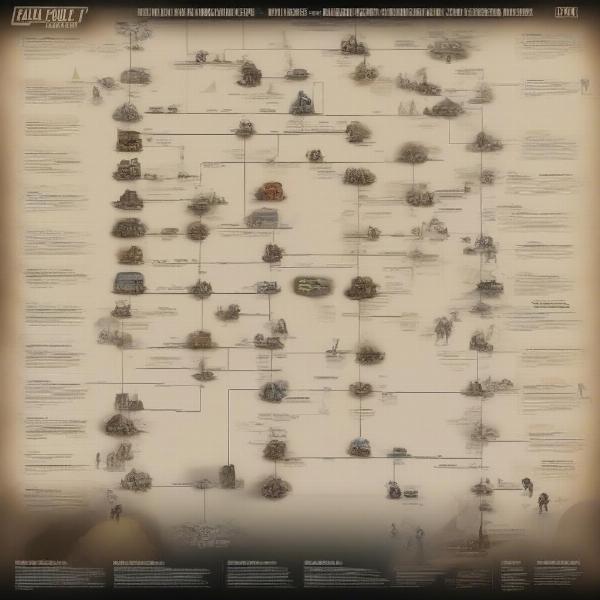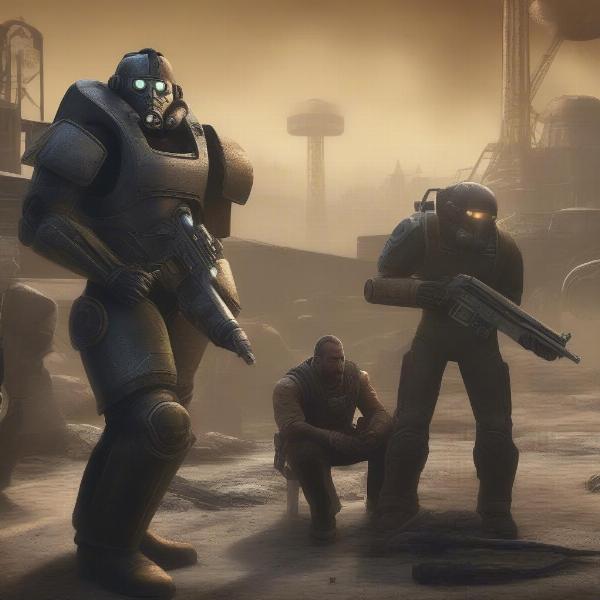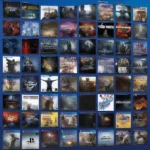Are The Fallout Games Connected? Yes, absolutely. While each game offers a unique standalone experience, they share a common ancestor and are interwoven through lore, recurring factions, and subtle references, creating a rich tapestry of post-apocalyptic history. Understanding these connections enhances the overall experience and allows players to truly appreciate the depth of the Fallout universe.
Unraveling the Fallout Timeline and Connections
The Fallout world is vast and spans centuries, starting from the divergence point in the mid-20th century where technology took a different path, focusing on atomic power and retro-futurism. This alternate timeline sets the stage for the Great War, a nuclear holocaust that reshapes the world into the wasteland we explore. While each game takes place in a different location and time period, they all build upon this foundation, referencing past events and featuring recurring factions like the Brotherhood of Steel and the Enclave. It’s not essential to play every game to understand the individual storylines, but recognizing these connections enriches the overall experience and adds layers of meaning to the world.
How the Games Relate to Each Other
The connections between Fallout games aren’t always direct sequels. Think of them more like branches on a family tree, sharing a common ancestor but growing in different directions. For example, Fallout 1 and Fallout 2 are direct sequels, following the descendants of the Vault Dweller. Fallout 3, however, jumps forward in time and location, introducing a new protagonist and setting but retaining the core lore and factions. Similarly, Fallout: New Vegas, while not a direct sequel to Fallout 3, shares the same world and references events from the previous game. This branching narrative structure allows for a diverse range of stories while maintaining the overall continuity of the Fallout universe.
Key Connections and Recurring Themes
Several recurring themes and elements tie the Fallout games together. The struggle for survival in a harsh, irradiated world is a constant. The moral ambiguity of choices and the impact of technology on humanity are also recurring themes. Factions like the Brotherhood of Steel, with their focus on technology, and the Enclave, remnants of the pre-war government, appear in multiple games, providing a sense of continuity and highlighting the long-term consequences of the Great War. These recurring themes and factions contribute to the cohesive narrative that runs through the entire series.
 Fallout Timeline and Connections: A visual guide connecting the different Fallout games and highlighting their place in the overall timeline
Fallout Timeline and Connections: A visual guide connecting the different Fallout games and highlighting their place in the overall timeline
Diving Deeper into the Lore
The Fallout universe is rich in lore, with each game adding its own chapter to the post-apocalyptic history. Understanding this lore adds depth and nuance to the player’s experience. From the origins of the Super Mutants to the rise and fall of various factions, the lore provides context for the world and its inhabitants. Discovering these hidden stories and connections is a rewarding aspect of exploring the wasteland.
The Significance of Vaults
Vaults, underground shelters designed to protect humanity from nuclear war, play a crucial role in the Fallout universe. While intended as safe havens, they often become the stage for social experiments, exploring the darker aspects of human nature. The stories that unfold within these vaults, from the controlled environment of Vault 101 in Fallout 3 to the gambling den of Vault 21 in Fallout: New Vegas, add to the overall narrative and offer a glimpse into the diverse ways humanity copes with isolation and adversity.
The Impact of the Great War
The Great War, the catastrophic nuclear conflict that devastated the world, is the defining event of the Fallout universe. Its impact is felt in every aspect of the games, from the irradiated landscapes to the mutated creatures that roam the wasteland. Understanding the causes and consequences of the war provides a deeper understanding of the challenges faced by the survivors and the motivations of various factions.
 Fallout Vaults and the Great War: Examining the role of Vaults in the Fallout universe and the devastating impact of the Great War
Fallout Vaults and the Great War: Examining the role of Vaults in the Fallout universe and the devastating impact of the Great War
Exploring the Fallout World: A Connected Experience
Exploring the Fallout world is a unique experience, made even more enriching by the interconnectedness of the games. While each title offers a self-contained narrative, the shared lore, recurring factions, and subtle references create a sense of continuity and depth.
Are there overarching stories across games?
Yes, there are definitely overarching stories and themes that connect the Fallout games. The ongoing conflict between the Brotherhood of Steel and the Enclave, for example, spans multiple games and demonstrates the long-lasting impact of pre-war ideologies. The emergence and evolution of Super Mutants is another example of a storyline that weaves through several titles. These overarching narratives add a layer of complexity and richness to the Fallout universe.
Do I need to play the games in order?
While playing the games in chronological order can enhance your understanding of the lore, it’s not strictly necessary. Each game offers a standalone experience, and you can jump in anywhere. However, playing earlier titles can provide valuable context and deepen your appreciation for later installments.
 Fallout Factions and Overarching Stories: A visual representation of key factions like the Brotherhood of Steel and the Enclave and their involvement in overarching storylines across the Fallout games.
Fallout Factions and Overarching Stories: A visual representation of key factions like the Brotherhood of Steel and the Enclave and their involvement in overarching storylines across the Fallout games.
The Fallout Universe: More Than Just Games
The Fallout universe extends beyond the games themselves, encompassing novels, comic books, and a dedicated fan community. These supplementary materials enrich the lore and provide further exploration of the world and its characters.
According to renowned Fallout lore expert, Dr. Emily Carter, “The interconnectedness of the Fallout games isn’t just a clever narrative trick; it’s a testament to the world-building genius of the creators. It creates a sense of depth and history that few other game franchises can match.”
This expansive universe offers endless opportunities for exploration and discovery, making the Fallout experience truly immersive.
Veteran game designer, Mark Johnson, adds, “The Fallout universe demonstrates the power of interconnected storytelling. By weaving these seemingly disparate narratives together, the creators have crafted a world that feels both vast and intimate, inviting players to delve deeper and uncover its secrets.”
The Fallout universe provides a unique and rewarding experience for players, offering a blend of engaging gameplay, rich storytelling, and a deeply interconnected world.
Conclusion
So, are the Fallout games connected? Absolutely. While each game can be enjoyed on its own, understanding the intricate connections between them elevates the overall experience. The shared history, recurring factions, and subtle references create a rich tapestry of post-apocalyptic lore, inviting players to delve deeper into the Fallout universe. Exploring these connections transforms the wasteland from a desolate backdrop into a living, breathing world with a compelling history.
FAQ
-
What is the chronological order of the Fallout games? While release order isn’t crucial for enjoyment, chronological order is Fallout, Fallout 2, Fallout 3, Fallout 4, and Fallout 76. Fallout: New Vegas takes place after Fallout 3.
-
Do I need to play all the Fallout games to understand the story? No, each game has a self-contained main story. However, playing previous games provides valuable context and enriches the overall experience.
-
What are the major factions in the Fallout universe? Key factions include the Brotherhood of Steel, the Enclave, the Institute, and the Railroad. Their roles and motivations evolve throughout the series.
-
What is the Great War in Fallout? The Great War is the devastating nuclear conflict that transformed the world into the wasteland seen in the games. It’s the central event that shapes the entire Fallout universe.
-
What are Vaults in Fallout? Vaults are underground shelters designed to protect humanity from nuclear war. They often play a crucial role in the games’ narratives and explore the complexities of human nature.
-
Where can I find more information about the Fallout lore? The Fallout wiki, fan communities, and official supplementary materials like novels and comics offer a wealth of information about the Fallout universe.
-
Are there any planned future Fallout games? While details are often kept under wraps, Bethesda has expressed interest in continuing the Fallout franchise, suggesting that future installments are likely.

